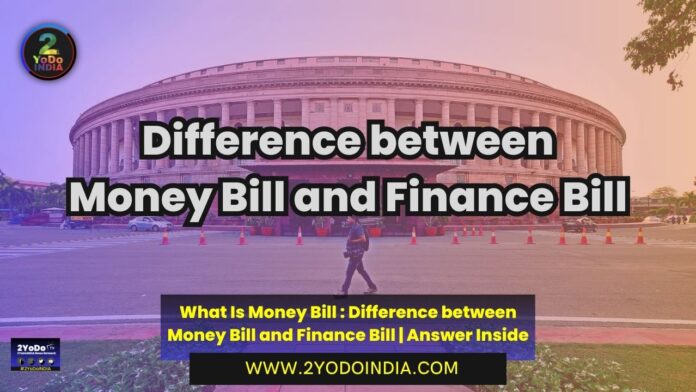Digital Personal Data Protection Bill, 2023 was introduce in the Lok Sabha on 3rd August 2023 by the union government. Ashwini Vaishnaw, the Union Minister for Communications, Electronics, and IT, introduce it in the parliament against fierce resistance from opposition leaders who argue it violated the fundamental right to privacy.
Government withdrew the bill on data privacy in 2022, and the new bill requires greater scrutiny and because of this, the opposition request that the bill be submit to the standing committee for review.
Ashwini Vaishnaw assert that this is not a money bill and that all objections will be address during the discussion.
Earlier as per reports, it was said that the Bill was being introduce under Article 117 of the Constitution, which deals with special provisions for Finance Bills.
What is Money Bill and Is it a part of Finance Bill?
A Money Bill is a particular kind of Finance Bill that can only include the topics list in Article 110(1)(a) to(g).
A Financial Bill is any bill that deals with revenue or expenses.
The unique rules pertaining to financial bills are cover by Article 117 of the Constitution. According to Article 117 (1), a Bill that addresses any of the issues list in sections (a) through (f) of Article 110 (1) may only be brought or move on the recommendation of the President and may not be introduce in the Rajya Sabha.
Money Bills and other Financial Bills that originate only in the Lok Sabha are examples of this first category of Financial Bills.
Article 117 (3) of the Constitution deals with the second group of finance bills.
Such Bills resemble regular Bills more.
This type of Financial Bill differs from an ordinary Bill in that, if pass, the former would require spending from the Consolidated Fund of India and could not be approve by either House without the President’s recommendation.
Such financial bills are exactly like regular bills in every other way, and they can even be introduce in the Rajya Sabha, change there, or discuss jointly by both Houses.
When a Financial Bill only falls within one of the seven headings specified in Article 110(1), which defines Money Bills, it is then refer to as a Money Bill.
A Money Bill is also a Financial Bill that the Speaker has approve.
Difference between Money Bill and Finance Bill
A “Money Bill” is one that, among other things, contains provisions governing taxes, how the government borrows money, and the expenditure of or receipt of money from the Consolidated Fund of India, as define by Article 110.
In contrast, Article 109 outlines the process for passing such a Bill and grants the Lok Sabha the authority to pass Money Bills.
Money and Financial Bills differ significantly in that the Rajya Sabha’s recommendations may be include in the latter, whilst their inclusion in the former is not require.
When it comes to Money Bills, the Lok Sabha has the ability to reject the Rajya Sabha’s recommendations.
A Money Bill differs from any other kind of Bill or Financial Bill in that it can only be introduce in the Lok Sabha, as specified in Article 117 (1), as oppose to an ordinary Bill, which can originate in either house.
Also, save on the President’s suggestion, no one may introduce or move a Money Bill in the Lok Sabha.
The President’s recommendation is not necessary for amendments that affect the reduction or elimination of any taxes.
Any financial Bill must first be introduce exclusively in the Lok Sabha and not the Rajya Sabha in order to qualify as a Money Bill.
Second, the President must recommend that these bills be introduce.
How both Money Bills and Finance Bills are passed in Parliament?
Rajya Sabha has a limited function in passing money bills.
These Bills can only be introduce in the Lok Sabha.
Money Bills are refer to the Rajya Sabha for recommendations after being approve by the Lok Sabha.
The Upper House must return the Bill to the Lower House with its advisory proposals within 14 days.
The Bill is regard to have pass by both Houses in the form in which it was pass by the Lok Sabha without the suggestions of the Rajya Sabha if the Lok Sabha rejects the recommendations.
The same effects would occur even if the Rajya Sabha does not provide its recommendations in a timely manner (within 14 days).
Therefore, the Rajya Sabha solely has a recommendatory responsibility with regards to Money Bills.
Ordinary Bills and other Financial Bills continue to require the support of both Houses of Parliament in order to be pass.
In contrast to Money Bills, they may very easily be reject or amended by the Rajya Sabha.
Aside from money bills, all other financial bills must go through all of the Rajya Sabha’s stages as regular bills.
This indicates that while the President may call a joint meeting of both Houses to resolve disagreements on a standstill in passing an ordinary Bill, a joint meeting cannot be call to resolve disagreements regarding a Money Bill.
The Aadhaar Act of 2016 and the Finance Act of 2017 are two of the most notable laws the government has pass during the past 7 years using the Money Bill process.





